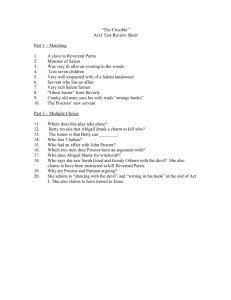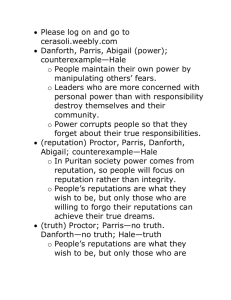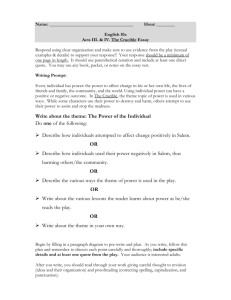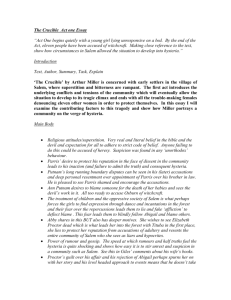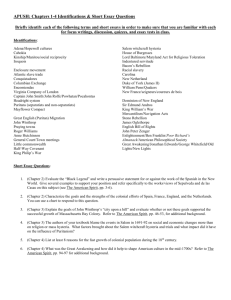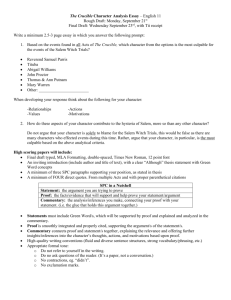Themes
advertisement
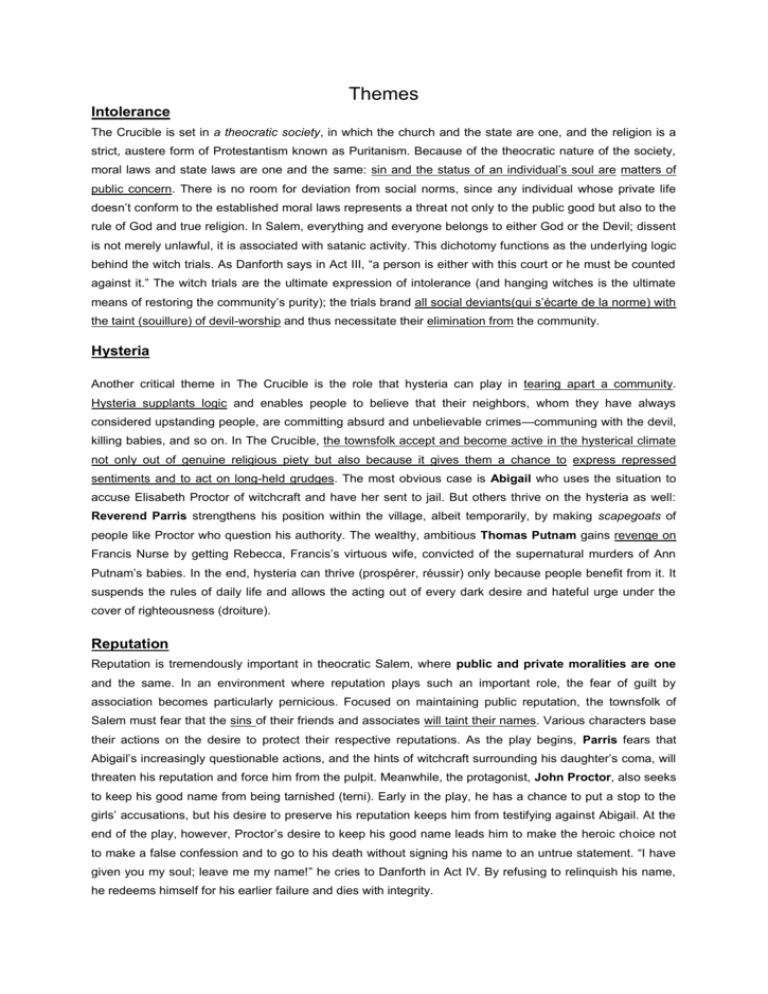
Themes Intolerance The Crucible is set in a theocratic society, in which the church and the state are one, and the religion is a strict, austere form of Protestantism known as Puritanism. Because of the theocratic nature of the society, moral laws and state laws are one and the same: sin and the status of an individual’s soul are matters of public concern. There is no room for deviation from social norms, since any individual whose private life doesn’t conform to the established moral laws represents a threat not only to the public good but also to the rule of God and true religion. In Salem, everything and everyone belongs to either God or the Devil; dissent is not merely unlawful, it is associated with satanic activity. This dichotomy functions as the underlying logic behind the witch trials. As Danforth says in Act III, “a person is either with this court or he must be counted against it.” The witch trials are the ultimate expression of intolerance (and hanging witches is the ultimate means of restoring the community’s purity); the trials brand all social deviants(qui s’écarte de la norme) with the taint (souillure) of devil-worship and thus necessitate their elimination from the community. Hysteria Another critical theme in The Crucible is the role that hysteria can play in tearing apart a community. Hysteria supplants logic and enables people to believe that their neighbors, whom they have always considered upstanding people, are committing absurd and unbelievable crimes—communing with the devil, killing babies, and so on. In The Crucible, the townsfolk accept and become active in the hysterical climate not only out of genuine religious piety but also because it gives them a chance to express repressed sentiments and to act on long-held grudges. The most obvious case is Abigail who uses the situation to accuse Elisabeth Proctor of witchcraft and have her sent to jail. But others thrive on the hysteria as well: Reverend Parris strengthens his position within the village, albeit temporarily, by making scapegoats of people like Proctor who question his authority. The wealthy, ambitious Thomas Putnam gains revenge on Francis Nurse by getting Rebecca, Francis’s virtuous wife, convicted of the supernatural murders of Ann Putnam’s babies. In the end, hysteria can thrive (prospérer, réussir) only because people benefit from it. It suspends the rules of daily life and allows the acting out of every dark desire and hateful urge under the cover of righteousness (droiture). Reputation Reputation is tremendously important in theocratic Salem, where public and private moralities are one and the same. In an environment where reputation plays such an important role, the fear of guilt by association becomes particularly pernicious. Focused on maintaining public reputation, the townsfolk of Salem must fear that the sins of their friends and associates will taint their names. Various characters base their actions on the desire to protect their respective reputations. As the play begins, Parris fears that Abigail’s increasingly questionable actions, and the hints of witchcraft surrounding his daughter’s coma, will threaten his reputation and force him from the pulpit. Meanwhile, the protagonist, John Proctor, also seeks to keep his good name from being tarnished (terni). Early in the play, he has a chance to put a stop to the girls’ accusations, but his desire to preserve his reputation keeps him from testifying against Abigail. At the end of the play, however, Proctor’s desire to keep his good name leads him to make the heroic choice not to make a false confession and to go to his death without signing his name to an untrue statement. “I have given you my soul; leave me my name!” he cries to Danforth in Act IV. By refusing to relinquish his name, he redeems himself for his earlier failure and dies with integrity.
